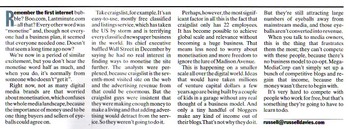Here's the Campaign doodah from Feb 9th. And here's the text:
Remember the first internet bubble? Boo.com, Lastminute.com, all that? Every other word was 'monetise' and though not everyone had a business plan it seemed that everyone needed one. Doesn't that seem a long time ago now? We're now in a period of similar excitement but you don't hear the monetise word half as much, and when you do it's normally from someone who doesn't 'get it'. Right now, not as many digital media brands are that worried about monetisation, which confuses the whole media landscape, because the importance of money used to be one thing buyers and sellers of eyeballs could agree on.
Take craigslist for example. It's an easy to use, mostly free classified and listings service which has taken the States by storm and is terrifying every classified newspaper business in the world. Their CEO baffled Wall Street in December by saying he had no real interest in finding ways to further monetise the site. The analysts were perplexed because craigslist is the 7th most visited site on the web and the advertising revenue from that could be enormous. But the craigslist guys were insistent that they were making enough money to make a living and that adding advertising would detract from the service. So they weren't going to do it. But perhaps the most significant factor in all this is the fact craigslist only has 22 employees. (The next smallest company in the web's top ten is Yahoo! with 10,000 employees.) It has become possible to achieve global scale and relevance without becoming a huge business. That means less need to worry about monetisation and more freedom to ignore the lure of Madison Avenue.
This is happening on a smaller scale all over the digital world. Ideas that would have taken millions of VC dollars a few years ago are being built by a couple of kids in a garage without any real thought of a business model. And only a tiny handful of bloggers make any kind of income out of their blogs. That's not why they do it. But they're still attracting large numbers of eyeballs away from mainstream media, and those eyeballs aren't converted into revenue.
When you talk to media owners this is the thing that frustrates them the most; they can't compete with these people because there's no business model to co-opt. MegaMediaCorp can't simply set up a bunch of competitive blogs and regain that income because the money wasn't there to begin with. It's very hard to compete with people who work for free, but that's something they're going to have to learn to do.

You've seen the light brother, and now my work is done. Today I can die a happpy man. Despite all your church goers' support, it was my advice you heeded. Blood is much thicker than rabid and baseless follwers then isn't it Russ?
And Thank GOD Janet won post of the month!
This is Saint Bumble signing off, from the Pearly Gates...
Posted by: Bumble Bavies | February 15, 2007 at 10:08 AM
Isn't Wikipedia (10 employees) the smallest in the top 10 ?
Good to see you back blogging Russell. Shame you've split the site. I like both bits and together but understand why...
Posted by: Jem | February 15, 2007 at 10:57 AM
I remember when that Craigslist story broke a few months ago (the 'we refuse to monetise' bit).
I applaud that stance - it makes their site more enjoyable - but what generally goes unmentioned is that the largest stakeholder in Craigslist is eBay.
So, as a cynic, I could point out that they're not going to starve.
As a super-cynic, I could imagine that the Craigslist marketing strategy is to stay as grassroots as possible - that could be their 'fit' in the eBay brand family.
Posted by: Jabberwocky | February 15, 2007 at 02:28 PM
Have you seen the movie StartUp.com? It's ancient now but sums up everything wrong - and right - with the .com boom.
It's also worth checking out F*cked Company [at www.fuckedcompany.com] because they wrote a book about some of the biggest .com disasters and why they happened. Key conclusion? .com success was in the eye of the greedy.
Posted by: Rob @ Cynic | February 16, 2007 at 04:44 AM
Ok Russell, at the risk of sounding political which is why I've got blogging block these days (plus new love but that's for another blog)I would like to jump in with the obvious rejoinder.
IMO the antique media could hold their own if they weren't editing out the bits of news I want to know.
Breaking myself of the newspaper reading habit was harder than giving up cigarettes. All my family have cancelled their home deliveries so the kids coming up aren't being sucked in, like we were.
The LA Times could stop the rot by selling just the Calendar section daily, most declining newspapers could deliver their sports section daily to most of the guys in my family. I bet tons of market researchers have told the editors this. Craigslist wouldn't have got a look in if people had stayed connected to their daily paper.
I would subscribe to most of the blogs I read daily, yours included. I miss big broadsheet single page ads, the good ones were a rush. But just like having one cigarette with a brandy, I'll forego the occasional pleasure to ensure peace of mind.
Posted by: Carol | February 16, 2007 at 03:16 PM
Russell, I think the game of chess offers an interesting insight into the difference between the previous boom and this one. I have elaborated further here :
http://thotblurb.blogspot.com/2007/02/to-monetise-or-not-lessons-from-chess_23.html
Posted by: blaiq | February 26, 2007 at 04:20 AM